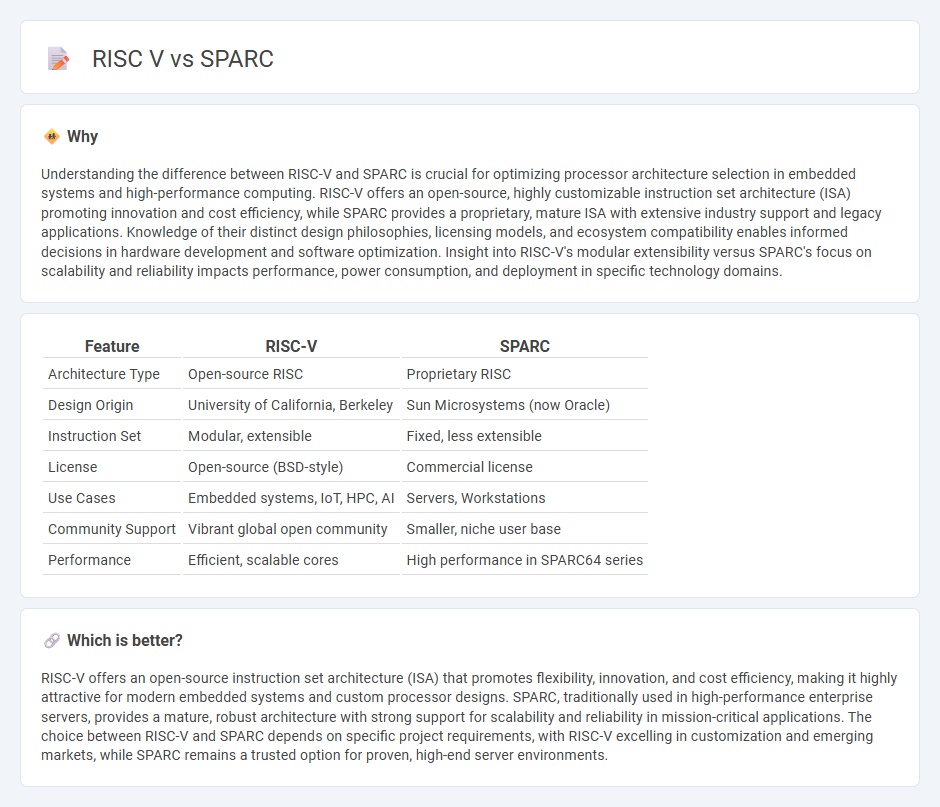
RISC-V and SPARC are prominent open instruction set architectures (ISAs) designed for efficient processor implementation in various computing environments. RISC-V offers a modular and extensible architecture widely adopted in academic, industrial, and embedded systems, while SPARC, developed by Sun Microsystems, has a legacy of robust performance in enterprise servers and high-end workstations. Explore the differences in architecture, ecosystem, and application domains to understand their impact on modern computing.
Why it is important
Understanding the difference between RISC-V and SPARC is crucial for optimizing processor architecture selection in embedded systems and high-performance computing. RISC-V offers an open-source, highly customizable instruction set architecture (ISA) promoting innovation and cost efficiency, while SPARC provides a proprietary, mature ISA with extensive industry support and legacy applications. Knowledge of their distinct design philosophies, licensing models, and ecosystem compatibility enables informed decisions in hardware development and software optimization. Insight into RISC-V's modular extensibility versus SPARC's focus on scalability and reliability impacts performance, power consumption, and deployment in specific technology domains.
Comparison Table
| Feature | RISC-V | SPARC |
|---|---|---|
| Architecture Type | Open-source RISC | Proprietary RISC |
| Design Origin | University of California, Berkeley | Sun Microsystems (now Oracle) |
| Instruction Set | Modular, extensible | Fixed, less extensible |
| License | Open-source (BSD-style) | Commercial license |
| Use Cases | Embedded systems, IoT, HPC, AI | Servers, Workstations |
| Community Support | Vibrant global open community | Smaller, niche user base |
| Performance | Efficient, scalable cores | High performance in SPARC64 series |
Which is better?
RISC-V offers an open-source instruction set architecture (ISA) that promotes flexibility, innovation, and cost efficiency, making it highly attractive for modern embedded systems and custom processor designs. SPARC, traditionally used in high-performance enterprise servers, provides a mature, robust architecture with strong support for scalability and reliability in mission-critical applications. The choice between RISC-V and SPARC depends on specific project requirements, with RISC-V excelling in customization and emerging markets, while SPARC remains a trusted option for proven, high-end server environments.
Connection
RISC-V and SPARC share a common heritage in reduced instruction set computing (RISC) architecture, emphasizing simplicity and efficiency in processor design. Both architectures support scalable and modular instruction sets, enabling implementation from embedded systems to high-performance computing. Their open standards encourage innovation and interoperability in hardware development.
Key Terms
Instruction Set Architecture (ISA)
SPARC and RISC-V are both open Instruction Set Architectures designed for efficient processing, with SPARC primarily targeting high-performance computing and RISC-V emphasizing modularity and extensibility for diverse applications. SPARC utilizes a register windowing technique to optimize procedure calls, whereas RISC-V offers a clean-slate design with a base integer ISA and multiple optional extensions for flexibility. Explore the detailed differences in instruction formats, encoding, and architectural features to understand their impact on software and hardware development.
Hardware Ecosystem
SPARC architecture, backed by decades of enterprise-level deployments, offers robust hardware ecosystems featuring mature processors and extensive support from established vendors like Oracle and Fujitsu. RISC-V's open-source ISA fosters rapid innovation with a growing array of customizable hardware platforms and active community-driven development, enabling diverse implementations from startups to industry leaders. Explore the evolving hardware landscape of SPARC and RISC-V to understand their impact on future computing architectures.
Source and External Links
SPARC (Scalable Processor ARChitecture) - SPARC is a reduced instruction set computer (RISC) instruction set architecture originally developed by Sun Microsystems.
SPARC (Scholarly Publishing and Academic Resources Coalition) - SPARC is a nonprofit organization advocating for open systems in research and education.
SPARC (Stimulating Peripheral Activity to Relieve Conditions) - SPARC is a program that accelerates the development of therapeutic devices using bioelectronic medicine.
 dowidth.com
dowidth.com